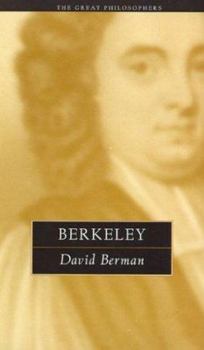Berkeley: The Great Philosophers
First published in 1999. Routledge is an imprint of Taylor & Francis, an informa company. This description may be from another edition of this product.
Format:Paperback
Language:English
ISBN:0415923875
ISBN13:9780415923873
Release Date:July 1999
Publisher:Routledge
Length:64 Pages
Weight:0.15 lbs.
Dimensions:0.3" x 4.3" x 7.0"
Customer Reviews
1 rating
Blow your mind with Berkelely's thought...
Published by Thriftbooks.com User , 15 years ago
The philosophy of George Berkeley (pronounced BARK-lee) will blow your mind. Literally. Page 36 of this graham cracker sized book describes one of Berkeley's thought experiments as "disorientating or even dangerous." This particular experiment explores how a mind with sight but devoid of a body (an "unbodied sighted mind") would process reality. The text warns that someone attempting to psychologically embody such a being risks deforming their senses beyond recovery. Berkeley, always the audacious Bishop, tried. His writings, some quoted here, hint at the perils of pushing the boundaries of thought. But he didn't stop there. Going far beyond anything showing on today's reality shows, he arranged a brush with mortality by hanging. Apparently he believed death involved a mere perceptual shift. To discover the attributes of this shift a friend agreed to hang him by the neck. Apparently this friend did so and revived Berkeley just in time. If that isn't enough to make your mandible fall through the floor, the good Bishop also drank tar water and encouraged others to do so for good health. Water. With tar. Amazingly he lived a long life, particularly for 18th century standards. By today's standards he sounds absolutely crazy. But Berkeley holds a secure place in the history of philosophy. He even sits amongst the "great" philosophers." How did this self-mutilating drinker of sludge rise to such prominence? This brief book outlines Berkeley's legacy. Even more, it stimulates curiosity in this unusual man to a near maddening degree. Anyone who would go to such lengths to prove a point possesses either raging passion or abject insanity. Berkeley was not insane. Instead his shocking thought experiments, which weaved philosophy with psychology, heightened his Idealism. They were designed to show the illusions of perception, or at least distrust in what our human senses deliver to us about our world. He remains famous for his conception that reality is purely mind-dependent. More laconically, this life thing is all in our minds. Along those lines, Berkeley challenges us to conceive of an object unperceived. Language, he adds, confuses us about the nature of reality. We should then strip away our linguistic prejudices to get at the things themselves which, contrary to Kant, Berkeley believes are accessible to us mere mortals. But everything comes only through direct experience. Cognition above direct perception, he argues, bubbles with illusions. His thought then represents empiricism and experimentation taken to steroidal extremes. But to achieve such heights people must move outside the "normal socio-linguistic framework." Here the text once again waves flaming flags of caution. Don't go too far or you may end up drinking tar water. Berkeley took on the great minds of his era. He argued against Locke's "abstract ideas" and even exposed flaws in Issac Newton's theories. Though he influenced later philosophers such as Hume, the 20th century, particularly t





